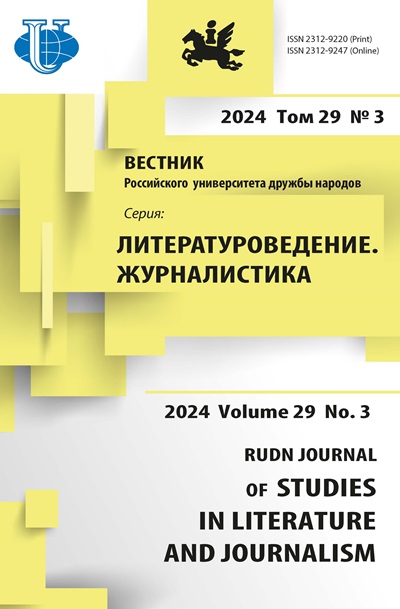The concept of life in the late work of F.A. Iskander
- Authors: Kirova M.M.1
-
Affiliations:
- Lomonosov Moscow State University
- Issue: Vol 29, No 3 (2024)
- Pages: 482-490
- Section: LITERARY CRITICISM
- URL: https://journals.rudn.ru/literary-criticism/article/view/41910
- DOI: https://doi.org/10.22363/2312-9220-2024-29-3-482-490
- EDN: https://elibrary.ru/DZXZHQ
Cite item
Full Text
Abstract
The purpose of this article is to explore the concept of “life” as understood by F.A. Iskander and to explain the genre specificity of his later works through a content analysis of metaphorical structures in the collections of essays, notes, and short stories by the writer. If his earlier works are mostly collections of short stories and novel-in-short stories, then later in his career he turns to such genres as collections of essays and notes. The focus of this study will be on the collections “A little about a lot” and “From notebooks”, the essays “Stalin and Vuchetich”, “State and conscience”, “Poets and kings”, “Mozart and Salieri”, and “Reflections of a writer”, as well as the short story “The plot of existence”. Life is not contrasted with death, and Iskander does not insist on the triumph of the positive over the negative in his work. Through this research, the author will draw the following conclusions. In his later work, Iskander departs from the conceptual metaphor of “life as wholeness”. He argues that only the depiction of life through art or theory can be considered complete, while life itself is inherently fragmented. He believes that only ideas founded on humanistic principles can bring some harmony to the chaotic nature of life. The main feature of Iskander’s later writings is fragmentation, which is based on associative thinking.
Keywords
About the authors
Maria M. Kirova
Lomonosov Moscow State University
Author for correspondence.
Email: mariakirova709@gmail.com
ORCID iD: 0000-0001-5353-8312
postgraduate student at the Department of Literary Theory, Faculty of Philology
1 Kolmogorova St, Moscow, 119991, Russian FederationReferences
- Antoniou, G.A., Antoniou, S.A., Georgiadis, G.S., & Antoniou, A.I. (2012). A contemporary perspective of the first aphorism of Hippocrates. Journal of vascular surgery, 56(3), 866–868. https://doi.org/10.1016/j.jvs.2012.05.002
- Darvin, Ch. (2016). On the origin of species. Moscow: Eksmo. (In Russ.)
- Davis, M.S. (1999). Aphorisms and clichés: the generation and dissipation of conceptual charisma. Annual Review of Sociology, 25(1), 245–269.
- Ermolin, E.A. (2011). Arch. The universe according to Iskander. Continent, 150, 420–431. (In Russ.) https://magazines.gorky.media/continent/2011/150/tverd-mirozdanie-po-iskanderu.html
- Ipanova, O.A. (2005). Life. In: Karasik V.I., Sternin I.A. (eds.) Anthology of concepts. Vol. 2. Volgograd: Paradigma. P. 146–156. (In Russ.)
- Iskander, F.A. (2004a). The complete collection of works: in 10 vols. Vol. 9: Goats and Shakespeare. Moscow: Vremya. (In Russ.)
- Iskander, F.A. (2004b). The complete collection of works: in 10 vols. Vol. 10: Ferryboat. Moscow: Vremya. (In Russ.)
- Ivanova, N.B. (1990). Laughter against fear, or Fazil Iskander. Moscow: Soviet Writer. (In Russ.)
- Ivanova, N.B. (2019). The world and the myth of Fazil Iskander. Proceedings of Gorky Literary Institute, 4, 8–12. (In Russ.)
- Kanevskaya, M. (2005). The shortest path to the truth: decentralization of discourse by Fazil Iskander. NLO, 72, 224–244. (In Russ.) https://magazines.gorky.media/nlo/2005/2/kratchajshij-put-k-istine-deczentralizacziya-diskursa-u-fazilya-iskandera.html
- Kolesov, V.V. (2002). ‘Fate’ and ‘Happiness’ in Russian mentality. In: Korneev M.Ya. (ed.) Reflections on philosophy at the crossroads of the second and third millennia. On the 75th anniversary of Professor M.Ya. Korneev. (“Thinker” Series. Issue 11). St. Petersburg: St. Petersburg Philosophical Society. P. 98–106. (In Russ.)
- Lachinov, A.V. (1998). A man and the world in the artistic system of F. Iskander. (Ph.D. Dissertation abstract). Nalchik. (In Russ.)
- Mindell, D. (2013). The tree of life: metaphor, model, and heuristic device. Systematic biology, 62(3), 479–489.
- Morrison, D.A. (2014). Is the tree of life the best metaphor, model or heuristic for Phylogenetics? Systematic biology, 63(4), 628–638.
- Sarnov, B.M. (1978). “The deeper you scoop...” (Notes on the prose of Fazil Iskander). Questions of Literature, 7, 126–151. (In Russ.) https://voplit.ru/article/chem-glubzhe-zacherpnut-zametki-o-proze-fazilya-iskandera
- Sugyan, I.M. (2012). Representation of the author’s position in F.A. Iskander’s artistic and journalistic works. (Ph.D. Dissertation abstract). Tver. (In Russ.)
- Sumarokova, E.V. (2013). Сoncept of life as organizing principle of F. Iskander’s artistic picture of world (on example of novel “Sandro of Chegem”). Proceedings of Irkutsk State Technical University, 8(79), 310–316. (In Russ.)
- Vygon, N.S. (1992). The artistic world of F.A. Iskander’s prose. (Ph.D. Dissertation abstract). Moscow. (In Russ.)
















